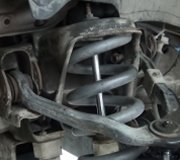"Fee fie fo fum; you're bill will be a mighty sum! Well, okay, maybe not, but driving it like that will lead to damaging more parts. The problem is often nothing more than a sticking piston in the brake caliper. Opening the bleeder screw won't help that problem. Working up the line, the rubber brake hose can become constricted and will trap the brake fluid and prevent it from releasing back up to the reservoir. Some cars have a metal bracket crimped around the middle of the hose. Rust builds up inside the crimp and squeezes the hose. Pedal pressure will force fluid through it to apply the brake but it can't release. The bracket can be opened up with a large pliers to solve that problem in a few minutes. When the hose is constricted, opening the bleeder screw will release the brake but cracking a steel line open at the master cylinder will not. The worst cause, and by far the most expensive is brake fluid contaminated with a petroleum product such as engine oil, transmission fluid, or power steering fluid. That will cause rubber parts to swell. The seals in the master cylinder will grow past the return ports and block them. The brake WILL release when the line is loosened at the master cylinder. The only proper repair is to replace everything that has rubber parts that touch brake fluid. That can run into thousands of dollars. The clue to that is the rubber seal under the reservoir cap will be blown up and mushy.
Tuesday, March 15th, 2011 AT 11:53 PM


